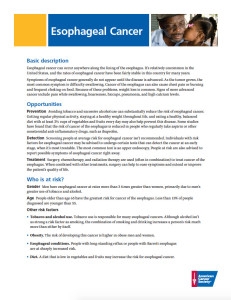Esophageal cancer is cancer that forms in the esophagus, the approximate 10-inch long tube that passes food from the mouth to the stomach. There are 2 types of cancer associated with the esophagus:
1. Squamous cell carcinoma: this form of cancer begins with the flat cells that line the surface of the esophagus with the most common causes being smoking, drinking alcohol or hot drinks and a poor diet (i.e. eating few fruits and vegetables).
2. Adenocarcinoma: this form of cancer begins with the mucus secreting cells, typically in the lower portion of the esophagus with the most common causes being smoking, obesity and gastroesophageal reflux disease (GERD).
Adenocarcinoma is significantly more prevalent in the United States and has a high mortality rate, which some believe to be attributable to the often late stage diagnosis of the disease. According to the National Cancer Institute, there will be approximately 18,170 new cases of esophageal cancer in the United States in 2014 with an estimated 15,450 deaths. Adenocarcinoma is the fastest growing form of cancer in the United States with some estimates having the growth rate at 600% from 1973 to 2006[1]
Download the Esophageal Cancer Fact Sheet  courtesy of the American Cancer Society
courtesy of the American Cancer Society
[1] Pohl, et al., Esophageal adenocarcinoma incidence: are we reaching the peak? Cancer Epidemiol Biomarkers Prev 2010;19:1468-1470. Published OnlineFirst May 25, 2010

